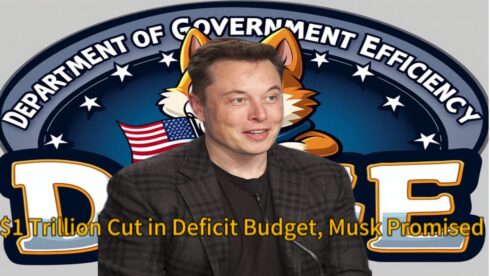Elon Musk, billionaire entrepreneur declared that his long-term objective is to help the United States reduce its national budget deficit by a staggering $1 trillion. Elon Musk emphasized that the growing fiscal imbalance poses a significant threat to national security and economic sustainability, adding that it is imperative for both public and private sectors to prioritize responsible financial stewardship.
This pronouncement, made during a televised economic forum, marks one of Musk’s most direct forays into the realm of national fiscal policy. While traditionally focused on technology and innovation through companies like Tesla, SpaceX, and X, Elon Musk’s pivot toward economic reform signals a broader ambition to influence policy on a structural level. His remarks are already sparking discussions among economists and lawmakers alike.
The Budget Deficit Crisis: A Snapshot of America’s Fiscal Imbalance
The U.S. federal budget deficit has been escalating at an alarming rate, with the Congressional Budget Office (CBO) projecting a shortfall of approximately $1.6 trillion for 2024 alone. Factors such as persistent deficit spending, rising entitlement costs, and substantial defense expenditures have all contributed to the ballooning national debt, now exceeding $34 trillion. Economists warn that without significant fiscal reforms, the U.S. risks weakening its creditworthiness and long-term economic resilience.
Musk’s concern aligns with those of financial watchdogs who argue that unchecked borrowing could lead to inflationary pressures, higher interest rates, and reduced global confidence in the U.S. dollar. By calling for a trillion-dollar reduction, Musk is challenging policymakers to rethink entrenched spending habits and adopt a more sustainable fiscal framework.
Private Sector Involvement: Elon Musk Advocates Entrepreneurial Efficiency
One of Musk’s key arguments is the necessity for public-private collaboration in addressing the budget deficit. He believes that the innovative and efficiency-driven mindset of the private sector could be leveraged to streamline government operations, reduce redundancy, and eliminate bureaucratic waste. According to Musk, introducing competitive market principles into public services could generate substantial cost savings over time.
Musk pointed to SpaceX as an example of how private companies can deliver critical infrastructure—such as space transport—at a fraction of traditional government costs. He proposed similar models be adopted in areas like healthcare, logistics, and data management to cut federal expenses without compromising service quality. His vision implies a radical restructuring of the way public funds are utilized.
Policy Leverage and Political Implications: A New Power Player Emerges
Elon Musk’s statement has ignited speculation regarding his growing political influence and potential role in shaping fiscal policy. Though not officially affiliated with any political party, Musk’s recent alignment with several conservative-leaning economic viewpoints has positioned him as a prominent figure among deficit hawks. His call for deficit reduction may embolden lawmakers seeking bipartisan support for sweeping fiscal reforms.
Some analysts suggest Elon Musk’s influence could steer public opinion toward supporting austerity measures, including spending caps, entitlement reform, and tax code restructuring. Critics, however, warn that Musk’s immense wealth and unconventional approach might alienate parts of the electorate concerned about equity and social welfare. Nonetheless, his fiscal narrative is gaining traction in a political climate increasingly focused on economic accountability.
Skepticism and Support: Mixed Reactions to Elon Musk’s Proposal
The response to Elon Musk’s trillion-dollar deficit reduction goal has been sharply divided. Fiscal conservatives and free-market advocates have praised his initiative, calling it a much-needed wake-up call. They argue that Musk’s track record in optimizing capital and scaling innovation offers a viable blueprint for trimming federal waste. Some have even urged Congress to engage with Musk in formal policy consultations.
On the other hand, progressive economists and social advocates caution that aggressive deficit reduction without a strategic plan could harm essential public services and widen inequality. They question whether Musk’s emphasis on efficiency may undervalue the social and humanitarian roles of government programs. As the debate unfolds, it is clear that Musk’s statement has reignited the national conversation on fiscal responsibility.
A Blueprint for Economic Resilience
While Musk has not yet outlined a detailed roadmap for achieving the $1 trillion deficit cut, he hinted at forming a think tank composed of economists, technologists, and policy experts to explore actionable solutions. This proposed coalition would assess the viability of AI-driven automation in government, defense budget optimization, and tax policy reform to achieve tangible results within a decade.
Whether Musk’s vision materializes into concrete policy remains uncertain, but his entrance into the fiscal debate marks a significant turning point. As the U.S. grapples with mounting debt and a shifting global economic landscape, voices like Musk’s—ambitious, disruptive, and unafraid of controversy—may play a pivotal role in shaping a more sustainable financial future. The trillion-dollar question now is: can innovation truly fix America’s fiscal deficit?














